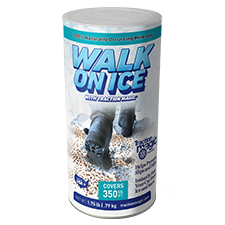How To Identify Weakening Concrete

Concrete is the foundation of most buildings, and it’s not uncommon to find that a structure’s concrete has deteriorated over time. Cracking and crumbling can lead to costly repairs and replacements, so knowing how concrete interacts with salt for driveway —can help you prevent these issues in your own home or business. If you’re using rock salt, calcium chloride, or magnesium chloride ice melt, this post is for you.

What causes concrete to weaken?
As discussed above, the effects of salt and deicers on concrete are well documented. The USGS states that “an estimated 10 to 15 percent of all bridge decks in the United States have been seriously damaged by deterioration due to chloride-induced corrosion.”
The primary cause for this damage is the fact that salt, calcium chloride, and magnesium chloride ice melt act as a catalyst for corrosion within the concrete, causing it to weaken and crack over time. In other words, these materials accelerate natural processes already occurring within concrete. They don’t create new problems—they just make existing ones worse!
What causes concrete to crack?
As previously mentioned, concrete is a very durable material. However, it cannot repair itself and will crack if it experiences stress or damage. Concrete cracks for many reasons:
- Water: Water penetration can lead to cracks in the concrete. If water enters through the upper surface of the slab and freezes, it expands and pushes against the lower portion of the concrete causing pressure on it which causes cracking.
- Frost lines: These are vertical cracks that run parallel with each other forming ‘V’ shapes as they move into a joint where two slabs meet up. These typically occur when there is frost below ground level during cold weather conditions which causes expansion in soil/rock around an area under construction and thus pushing apart adjacent slabs that were not properly sealed off.
What causes concrete to crumble?
When it comes to what causes concrete to crumble, salt for the driveway is the primary culprit. Salt is a chemical that can cause concrete to crumble by wearing away at it over time.
Concrete is made of cement, sand, and water—a mixture that must be mixed in a certain way so that it hardens properly when exposed to air. But chemicals in calcium chloride and magnesium chloride ice melt may react to cause crumbling.
Rather than using salt or other chlorides, you can use 100% environment-friendly salt for driveways such as Safe Thaw. With the urea-modified core, special glycols, surfactants, and ice melting boosters, Safe Thaw does not impact your concrete in any way. It is salt-free and safe for your pets, kids, and any surface material.
100% salt & chloride-free, fast acting Ice Management Solution
Conclusion
Hopefully, this post has given you a better understanding of the ways that deicers and salts can weaken the concrete. If your concrete has been compromised by salt, you can follow the above steps to strengthen it. For more information about how to keep your concrete strong for years to come, contact us today!
Try Also Our Other Winter Safety Products:
Safe Paw
The Original and #1 Selling Pet and Child Safe Ice Melt for over 20 years. Guaranteed environmentally safe –It won’t harm animals or children, and it won’t damage your property. That’s Safe Paw. Safe Paw can change how winter affects our planet.

Walk On Ice
The handy disposable canister can be taken everywhere, with the same 100% naturally occurring minerals that provide instant traction on ice or snow. Use it on sidewalks, steps, or as an instant traction agent for your car.


